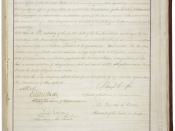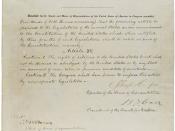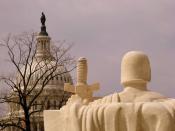The Bill of Rights is the first ten Amendments to the United States Constitution. They were added by the Founding Fathers to assert inalienable rights that would exist despite the power of the federal government. Careful consideration was made in creating these laws, as they were meant to stand the test of time. The wording, even the punctuation, has helped interpret various meanings in effort to encompass the ever-changing aspects of what is considered a "right". The first and second of these were (arguably) written foremost by order of importance, at least during the time, as the issues of today have changed.
Some describe the First as the most essential in maintaining democracy. The First Amendment provides the freedom of religion, speech, press, peaceful assembly and the right to petition-or appeal to the government. Without these rights one could not pray as they wish, say what they wish, create group to defend ideals, or question the government.
Conflict erupts as Americans attempt to define the extent of the boundaries to this freedom.
Today such challenges exist in way perhaps unexpected by the Founding Fathers, thus the Constitution is examined and debated to address new issues. The First Amendment right to members of the press' right to protect their sources is as of late under scrutiny. Reporters and journalists are subpoenaed into court often in effort to solve crimes or corruption. With the invention of the internet, addressing this right has become increasingly challenging as in the case of O'Grady vs. the Supreme Court. Apple computer sued an internet web site that leaked information on an up-and-coming technology. The courts decided if it was within this bloggers First Amendment right not to be subpoenaed to reveal the name of the individual who leaked information. After many rulings the case was...


